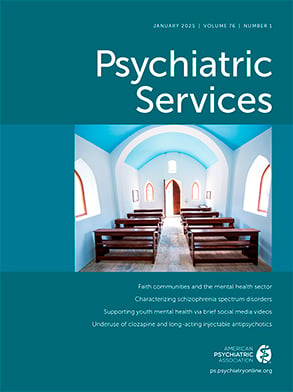To the Editor: Racial-ethnic disparities in mortality have been extensively noted in the literature (
1). A number of studies have also established that a diagnosis of a mental disorder increases a person's risk of premature death (
2). However, research has not focused on the issue of “double jeopardy,” as postulated by Dowd and Bengtson (
3). If race-ethnicity and a mental illness diagnosis lead to a double disadvantage in regard to health, then racial-ethnic health disparities should be greater among persons with mental illness than among those who do not have mental illness.
To address this issue, I compared racial-ethnic differences in premature mortality among decedents with severe mental illness and decedents in the general population without mental illness. Death records for the City of Akron, Ohio, were matched with clinical case management files from Community Support Services (CSS), a community mental health center in Akron. The sample consisted of 16,164 individuals who died between January 1998 and December 2004; 647 of these individuals also had CSS records and 15, 517 did not. The mean±SD age of decedents in the sample was 79.4±11.4 years. Fifty-six percent (N=9,052) of the decedents were female, 20% (N=3,233) were African American, and 80% (N=12,931) were white. The sample and methods have been described extensively elsewhere (
2). Analysis was limited to African Americans and whites because reporting of race on death certificates for these groups has been shown to be accurate (
4).
I used multivariate ordinary least-squares regression to estimate premature mortality, adjusting for gender, marital status, education, mental illness diagnosis, race, and cause of death. After the analysis controlled for the other factors, race (b=2.5, p≤.001) and a mental illness diagnosis (b=4.5, p≤.001) were significantly related to premature mortality. The regression coefficients were used to calculate the predicted values of years of potential life lost (YPLL) for CSS and non-CSS decedents by race. The difference in YPLL between African Americans and whites was smaller among CSS decedents than among non-CSS decedents (2.1 years and 2.5 years, respectively). CSS decedents who were African American lost 15.8 years of life, compared with 13.7 years for white CSS decedents. Among non-CSS decedents, the YPLL for African Americans was 11.7 years, compared with 9.2 years for whites, for whom YPLL was lowest. [A table summarizing these results is available as an online supplement to this letter at
ps.psychiatryonline.org.] As a final step, an interaction term was entered in the regression model to assess whether a mental illness diagnosis had a differential effect on YPLL by race. This interaction was not significant.
Although both racial minority status and a mental illness diagnosis contributed independently to premature mortality, African-American decedents with severe mental illness in this study did not have a differential vulnerability to premature mortality compared with white decedents with severe mental illness. Although premature mortality was higher among CSS decedents overall (
2), racial differences in YPLL among CSS decedents were smaller than racial differences in YPLL in the non-CSS sample. This appears to be because YPLL was so much higher among the white CSS decedents. These findings provide further support for the addition of primary health care services to mental health treatment.
Acknowledgments and disclosures
The author thanks Christian Ritter, Ph.D., Robin Shura, Ph.D., and Erica Hill, M.A., for helpful comments on drafts of this letter.
The author reports no competing interests.

